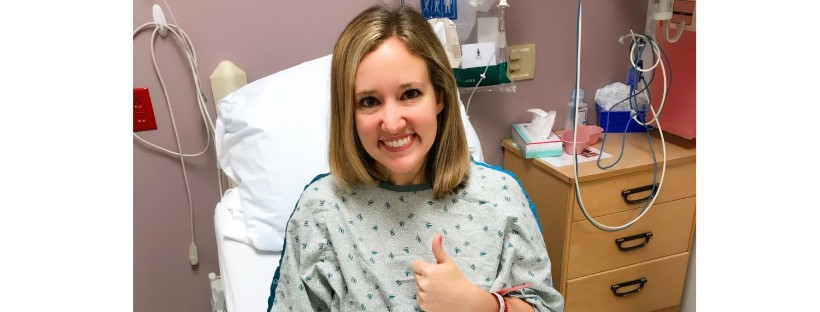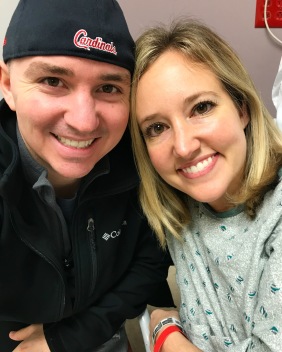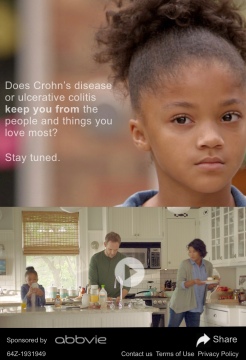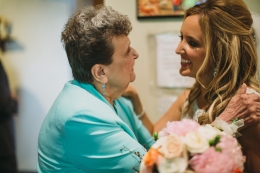Deb Weiner traveled to Israel on her Birthright Israel trip back in 2010, like many young Jewish adults. Except she had Crohn’s disease. The Birthright trip is an important milestone for many young Jewish adults, unfortunately her inflammatory bowel disease created many obstacles.  Despite making life-long friendships and memories, she felt the challenges of her dietary restrictions, and couldn’t take in all the monumental experiences like her peers.
Despite making life-long friendships and memories, she felt the challenges of her dietary restrictions, and couldn’t take in all the monumental experiences like her peers.
This is where a trip for people with Inflammatory Bowel Disease (Crohn’s and Colitis), Irritable Bowel Syndrome and non-Celiac gluten sensitivity comes in. It’s a time for young adults to discover new meaning in their personal Jewish identity and connection to Jewish history and culture. IBD is most commonly present in people of Caucasian and Ashkenazic Jewish origin.
I’m so excited to announce that registration for this once in a lifetime trip opens TOMORROW (Jan. 30, 2018)!
Here are some key details:
o Dates: August 6 – August 17, 2018 (10) day trip
o Open to residents in the United States and Canada
o Medical staff will be traveling with participants throughout the trip
o Refrigeration is available for all injectable medications (including sharps containers)
o Meals that cater appropriately for all participants
o More scheduled bathroom breaks
o Travel accommodations that take additional restrictions (chronic fatigue, joint pain) into consideration
Wonder if you’re eligible to attend? Here are the requirements:
o Must have at least one parent of recognized Jewish decent
o Age 18-26 (post-high school)
o Have not traveled to Israel before on a peer education trip or study program after turning 18
o Have not lived in Israel after age 12
 “A Birthright Israel trip includes airfare from major cities, hotels, meals, transportation within Israel, and costs associated with touring the country,” said Deb, who as a Crohn’s patient herself, is helping with the coordination of this program for Israel Outdoors.
“A Birthright Israel trip includes airfare from major cities, hotels, meals, transportation within Israel, and costs associated with touring the country,” said Deb, who as a Crohn’s patient herself, is helping with the coordination of this program for Israel Outdoors.
Deb remembers wanting to climb to the top of Masada, an ancient fortress that overlooks the Dead Sea, but the climb took place after a very strenuous day, and she didn’t feel well enough for the climb.
“With this trip, no one has to miss out on anything. Accommodations are offered that I would have loved to have benefited from. For instance, for those who aren’t up for the hike, a cable car will take the group to the top of Masada. When it comes to sharing a room, there are less people per room than on a typical Birthright Israel trip, making it easier to maneuver, and taking bathroom turns and whatnot. Participants will be staying with peers who understand what they are going through,” said Deb.
The Birthright Israel trip is considered the most successful Jewish initiative in the world, with more than 600,000 young adults participating. Deb has truly seen her personal experience come full circle. She’s been the young 20-something on the trip, feeling isolated and concerned. Now, nearly eight years later, Deb has the foresight and the knowledge about what young adults just like her need, to make the experience one that is enjoyable and comfortable.
“We want to share an experience and create lasting memories and friendships. There shouldn’t be a reason not to go on this trip, so we are bridging the gap. We want those with IBD, IBS, and non-Celiac gluten sensitivity to have the same great experiences as those who go on Israel Outdoors’ classic Birthright Israel trip,” said Nate Edelstein, North American Director for Israel Outdoors. 
Click here to register. You are encouraged to apply within the first week of open registration to secure a spot. The maximum trip number is 40 people and applications are accepted via email on a rolling basis. Israel Outdoors hopes to offer this trip every summer and possibly twice a year (summer and winter) if there is enough interest and demand.


 Everyone knows the prep is far from desirable and it doesn’t help when you’re famished. For some reason, this go around was especially difficult on me. I was incredibly nauseated and weak. I vomited multiple times. I could barely get it down.
Everyone knows the prep is far from desirable and it doesn’t help when you’re famished. For some reason, this go around was especially difficult on me. I was incredibly nauseated and weak. I vomited multiple times. I could barely get it down. As I sat alone in my hospital gown, waiting for the IV and the procedure I had a few moments to think, pray and reflect about my patient journey. My husband Bobby came back to see me, held my hand, kissed me a few times and I was whisked away. I woke up to the best news! There were no signs of inflammation or active disease and my streak of “remission” continues. I put that word in quotes because I am always hesitant, as my symptoms always come out of left field and blindside me. For now, I am going to bask in this celebratory moment, enjoy every feel good day and take in the relief of knowing I’ve gone through another colonoscopy and passed with flying colors!
As I sat alone in my hospital gown, waiting for the IV and the procedure I had a few moments to think, pray and reflect about my patient journey. My husband Bobby came back to see me, held my hand, kissed me a few times and I was whisked away. I woke up to the best news! There were no signs of inflammation or active disease and my streak of “remission” continues. I put that word in quotes because I am always hesitant, as my symptoms always come out of left field and blindside me. For now, I am going to bask in this celebratory moment, enjoy every feel good day and take in the relief of knowing I’ve gone through another colonoscopy and passed with flying colors!
 I had just gotten off the stage after speaking at the Crohn’s and Colitis Foundation Patient Symposium Event in October. Her and her mom, Michelle, approached me outside of the auditorium. Tears in their eyes. Smiles on their faces. I immediately felt a connection and knew this little girl was something special.
I had just gotten off the stage after speaking at the Crohn’s and Colitis Foundation Patient Symposium Event in October. Her and her mom, Michelle, approached me outside of the auditorium. Tears in their eyes. Smiles on their faces. I immediately felt a connection and knew this little girl was something special. She’s had a total of three colonoscopies, an endoscopy and an MRE. She’s been hospitalized due to flare ups three times. She has three siblings at home, so as she’s in the hospital or going to the doctor, her parents have to care for them as well. There’s a reason for the saying—’it takes a village’… because it really does.
She’s had a total of three colonoscopies, an endoscopy and an MRE. She’s been hospitalized due to flare ups three times. She has three siblings at home, so as she’s in the hospital or going to the doctor, her parents have to care for them as well. There’s a reason for the saying—’it takes a village’… because it really does. Also, as a parent of a child with a chronic illness, we are their best advocate. No one knows your child better than you do. If you think that something isn’t quite right, trust your momma instincts!”
Also, as a parent of a child with a chronic illness, we are their best advocate. No one knows your child better than you do. If you think that something isn’t quite right, trust your momma instincts!” Right before the shot, she relaxes her leg, takes a deep breath and pretends she’s anywhere but the living room couch.
Right before the shot, she relaxes her leg, takes a deep breath and pretends she’s anywhere but the living room couch.



 I was immediately at a loss for words. But in a good way. I’ve been those people in that commercial. I’ve witnessed family members look at me sympathetically as I excuse myself from the room. I’ve held my stomach and grimaced in pain, doing all I can not to miss a moment of a social gathering. I was recently at the movie theater with my husband, gazing with jealousy at people who could eat popcorn…willing myself not to buy any.
I was immediately at a loss for words. But in a good way. I’ve been those people in that commercial. I’ve witnessed family members look at me sympathetically as I excuse myself from the room. I’ve held my stomach and grimaced in pain, doing all I can not to miss a moment of a social gathering. I was recently at the movie theater with my husband, gazing with jealousy at people who could eat popcorn…willing myself not to buy any. I’ve been on Humira almost 10 years. I don’t need to be sold on the drug. But this campaign means the world to me. It represents what my parents, husband and son endure by my side. This disease impacts more than just the patient. It’s a family affair. When my son is old enough I want him to be empowered by my strength, but able to empathize with my struggles. Thank you, AbbVie for recognizing this and giving the world an inside look at the IBD patient and family experience. The commercial ends with “To be continued”… I can’t wait to see what’s next.
I’ve been on Humira almost 10 years. I don’t need to be sold on the drug. But this campaign means the world to me. It represents what my parents, husband and son endure by my side. This disease impacts more than just the patient. It’s a family affair. When my son is old enough I want him to be empowered by my strength, but able to empathize with my struggles. Thank you, AbbVie for recognizing this and giving the world an inside look at the IBD patient and family experience. The commercial ends with “To be continued”… I can’t wait to see what’s next.
 When those close to me are in harms way, I have a difficult time compartmentalizing my stress and worry and not allowing it to impact my Crohn’s disease.
When those close to me are in harms way, I have a difficult time compartmentalizing my stress and worry and not allowing it to impact my Crohn’s disease. I have never been able to handle the thought of life without her. It’s overwhelming not to have my grandma here to talk with all the time, visit, share the holidays with and I’m heartbroken that she’ll never get to see Reid grow up. I’m also scared about dealing with this major loss and having it throw me into a tailspin. The last thing she would ever want, is for me to be sick. Each hospitalization, each flare, each setback, always hurt her heart. She hated to hear of any complications or issues. So, I know I need to be strong and reign this in…in her honor.
I have never been able to handle the thought of life without her. It’s overwhelming not to have my grandma here to talk with all the time, visit, share the holidays with and I’m heartbroken that she’ll never get to see Reid grow up. I’m also scared about dealing with this major loss and having it throw me into a tailspin. The last thing she would ever want, is for me to be sick. Each hospitalization, each flare, each setback, always hurt her heart. She hated to hear of any complications or issues. So, I know I need to be strong and reign this in…in her honor. What can we do when we know we have to go on and be healthy for our families, but struggle to manage our IBD—even with a combination of strong medications?
What can we do when we know we have to go on and be healthy for our families, but struggle to manage our IBD—even with a combination of strong medications?